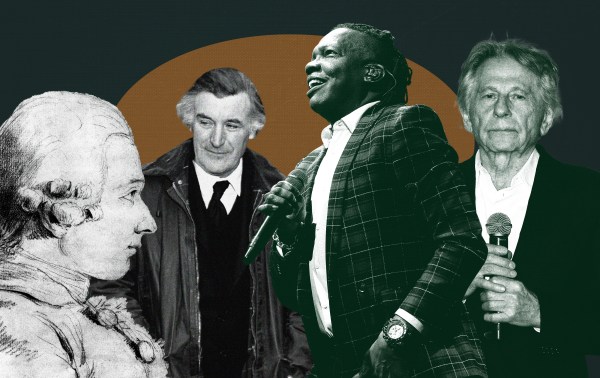About 30 years ago, I was having lunch at Connaught Place in New Delhi when a young, white, obviously American guy stopped to ask me for directions. He was pretty obviously new in town, and he had the shaved head and saffron robe of the Krishna Consciousness movement. I pointed him in the right direction and offered some unsolicited advice about his mode of dress, which, however well-intentioned, was not generally kindly looked upon in India at that time, at least in my experience. But the spiritual glow was on him, and he floated off in a cloud of bliss. I saw him again a few days later, dressed like an ordinary American tourist and obviously having suffered a beating, though not the kind that puts one in the hospital. I am sympathetic to the world’s spiritual seekers, especially the young ones who tend to look for exotic and picturesque religious avenues to explore. And I suppose that a beating can be a spiritual exercise, too—St. Peter seemed to think so.
I thought a little about that guy when listening to Snipe Hunter, the new album from country (please don’t call his music Americana!) singer Tyler Childers, who has at times described Krishna as his “chosen deity” and who incorporates the occasional Hindu theme, along with a good deal of Hare Krishna chanting on one song. He sings a bit about Kurukshetra, the Indian region associated with the Bhagavad Gita, confessing:
I couldn’t even tell you if I am or not pronouncin’ it right
But comin’ from a cousin-lovin’ clubfoot somethin’ somethin’
Backwood searcher, I would hope that you’d admire the try.
I do admire the try, and about two-thirds of the album. If that sounds like damning with faint praise, it isn’t—two-thirds is pretty good. Even the greatest rock ’n’ roll album ever made (I Against I) has its dead spots. And where Snipe Hunter shines, it shines brightly.
About that title: Hunting is, indeed, one of the album’s major themes, one Childers returns to on several songs. It is a good metaphor: Childers is a son of Lawrence County, Kentucky, and his songs emphasize his rural and Appalachian roots. He is also very interested in blood and guts, both as subject and as imagery, and he is, it would seem, hunting for something. It is difficult to say what that is, exactly, but there isn’t any need to: Even the best and most capable pop music lyricists—Leonard Cohen, Tom Waits, etc.—are almost by necessity and certainly by convention slippery and allusive. If you want your message spelled out for you in grammatical sentences with practice-vocabulary words, there is a whole SAT-prep course worth of Bad Religion albums out there waiting for you.
Childers, who famously won an award for “Americana” music and gave an acceptance speech in which he rejected the label as meaningless, insisting that he is, simply, a country singer, is very much a product of this wonderfully decentralized moment in popular music, which has been especially good for the country and country-adjacent music that is sometimes indicated by the label “Americana.” Platforms such as YouTube have brought us such delights as Western AF, with its emphasis on quirky and generally raw artists and a mishmash of traditionalism and a certain Austin-to-Brooklyn modern sensibility (think Patsy Cline and Buck Owens with face tattoos), along with politically charged artists such as Oliver Anthony and figures such as Jelly Roll. Bitching about the power brokers in Nashville and the insipidity of country radio is a tradition just about as old as country music itself, but technology and that great, generally unacknowledged enemy of the country sensibility—social change—has made those old gatekeepers irrelevant, with results that are, to my ear, pretty good, if you have the time to sort through a lot of dreck or have somebody to do the sorting for you. (The digital elimination of gatekeepers in other sectors, such as the news media and political communication, has had less lovely results. Different things are different, as it turns out.) Tyler Childers has now hit the big time (sharing a stage with the Rolling Stones, among other adventures) and was able to do so without making any obvious compromises with commercial pressures—but while availing himself of the benefits the mainstream industry has to offer, including, in the case of this album, the services of producer Rick Rubin. The sensibility that once ruled “outlaw” country is now in charge of the show.
Childers’s success is the subject of the album’s best song, “Eatin’ Big Time,” a fun, shuffling romp that begins as a hunting story about blasting a deer from the doorway of a grand house:
I had shot it from a blind, as in you’d be blind not to see
That there’s a man in the doorway of a m———-n’ mansion
Aiming at the feeder where you’d sat to take a feast.
It then escalates into a self-deprecating variation of the standard hip-hop boast:
Keep my time on my Weiss
You’re goddamn right I’m flexin’
’Cause a thousand-dollar watch is fine enough flex for me
Have you ever got to hold and blow a thousand f—–g dollars?
It runs for 40 hours, and then it winds itself to sleep.
Weiss is a Nashville-based watchmaker—not cheap stuff, but not the costs-more-than-a-nice-house timepieces that Jay-Z (and Bill Clinton) love to sport. That is the kind of modest success Childers likes to write about:
It’s fought for like a bitch, and it’s a bitch to keep it goin’
When they ain’t nobody knowin’ any prayer you’ve ever sang
See me now, I’m on the sow, and I’m ridin’ to your city
Eatin’ big time . . . .
In both tone and style (and in the musical composition itself) it reminds me a good deal of “Work Conquers All” by American Aquarium, another country outfit, one that dives headlong into the kind of progressive politics that Childers toys with from time to time. The sort of people who admire that kind of politics and want more of it from singers and other performers are desperate for authenticity, for lack of a better word, just as the right-wingers who tried to recruit “Rich Men North of Richmond” singer Oliver Anthony to use as a mascot were. And there is something happening with that in Childers’ writing and performance, though it is subtle. I don’t know how much of his accent is an exaggeration and how much is an outright put-on, but he does rhyme “steal” and “heal” with “pill.” His Appalachian-ness is not phony, but it is histrionic. If Bruce Springsteen’s working-class persona was part of a “white minstrel act,” as one critic described it, then Childers’s persona is the spectrum of Appalachia you get when you drive from southwestern Virginia into eastern Kentucky: It’s the same, but more so.
The album overall is a mixed bag, as albums usually must be. “Cuttin’ Teeth” is a pretty standard country memoir, with a very traditional pedal-steel opening and Childers employing a different register, a whispery and raspy voice. He may not have an enormous range, but he does have an arsenal of different voices, which makes sense for a songwriter who is (like many of the best of his kind) about three-quarters of the way to being a short-story writer. He is blessedly liberated from the kind of McDonald’s-level consistency expected of so many performers in our time. He also has a nice way with opposition and wordplay, noting in “Cuttin’ Teeth” that while money was tight, his pants were getting tight, too, an occupational hazard for the traveling troubadour living on bar food. The days when the American poor had to tighten their belts are long past.
That is followed by “Oneida,” a pretty little country waltz telling the story of what sounds like a Harold and Maude romance, with only the sudden jarring appearance of the word “bro” to remind you that you’re still in the 21st century.
Addiction is another favored Childers theme, both the problems he has had in his own life (drinking) and the ones that plague his Appalachian friends and neighbors. There’s “Getting to the Bottom,” which I take to be a reference to AA jargon about “hitting bottom,” which has both a bit of comedy (the backup singers come in with perfect harmony as he complains that the weather is hotter than “the devil’s dick on fire,” and it’s a genuinely funny moment) but also some plain-spoken poetry that will be entirely familiar to those who have been there:
I know this: I never wanna get that way again
Feelin’ like my head’s a house with a roommate movin’ in
Who’s incessantly talkin’, never slowing down
Possessed with evil urges, burn it to the ground.
For a drunk who doesn’t want to be a drunk anymore, there is a kind of funhouse quality to being intoxicated, which is captured nicely in “Getting to the Bottom” by a synthesizer solo with chromatic passages that slyly reference Julius Fučík’s “Entrance of the Gladiators,” which most people know simply as “that circus music.”
“Bitin’ List” is a revenge fantasy about all the people the singer would attack if he discovered he had an incurable case of rabies, a fun if somewhat standard-issue honky-tonk run enlivened by Oliver Child-Lanning’s jaw-harp playing. Like much of the album, it offers a layered, sonically complicated melange that is unlike what one usually associates with Rick Rubin, the less-is-more maestro whose mantra has always been “strip it down.”
(You know who else I once ran into while he was wearing a kind of Indian sadhu costume like that guy in New Delhi? Rick Rubin, outside a Starbucks in Malibu.)
There’s a fair bit of filler on the album, meditations about how it takes a long time to fly to Australia to gawk at syphilis-infected koalas, 21st-century white guy references to The Shawshank Redemption, that kind of thing. There’s also some material that you will need a decoder ring to follow if you don’t happen to be the sort of person who knows what a 32 Northstar is. There is a great deal of top-shelf work from collaborators, notably Kory Caudill on organ.
And then there’s the India thing, the Krishna chant on “Tomcat and a Dandy,” the half-assed exegesis in “Tirtha Yatra,” etc. Childers was born too late for a hanging-out-with-Ravi-Shankar phase, but Krishnacore punk singer Ray Cappo (why yes, all of my points of reference do come from the 1990s) still walks the Earth—perhaps they could collaborate. I like a good rousing kirtan as much as the next guy, but, unlike the other eccentricities in Childers’ work, this feels like pure affectation. And if you want to spice up country music with Asian exotica, Terry Allen did it better a million years ago, from the rollicking “New Delhi Freight Train” to the bleak stuff on Amerasia.
All in, though, this is a very enjoyable album from an interesting guy who is off on his own weird little journey into … I want to write Americana, but I’ll take him at his word that he’s just a country singer.










Please note that we at The Dispatch hold ourselves, our work, and our commenters to a higher standard than other places on the internet. We welcome comments that foster genuine debate or discussion—including comments critical of us or our work—but responses that include ad hominem attacks on fellow Dispatch members or are intended to stoke fear and anger may be moderated.
With your membership, you only have the ability to comment on The Morning Dispatch articles. Consider upgrading to join the conversation everywhere.